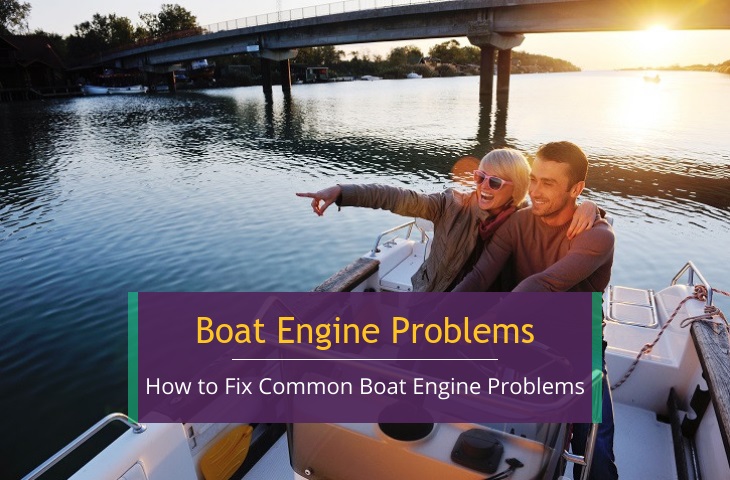With summer fast approaching, boat owners are rearing to get back on the open waters.
But is your boat's engine up to the task? Will it rise to the occasion and make each boating day a success? Or will it seize up and die, leaving you dead in the water?
Like a car engine, boat engines often breakdown too (unless of course it's a kayak or canoe!). Fortunately, most of these problems are preventable. Dig in as we look at some common boat engine problems and how to best mitigate them and enjoy many boating days.

“My escape is to just get in a boat and disappear on the water.”
- Carl Hiaasen, American Journalist and Novelist-
Recommended Reading: Practical Boat Mechanics: Commonsense Ways to Prevent, Diagnose, and Repair Engines and Mechanical Problems
Your Boat Has an Engine Problem If It Won't Start
Related: What To Do If Your Boat Engine Won't Start? (coming soon)
You turn the ignition, and instead of a throaty roar, you're met with dead silence. Merrimac Marine Insurance reports that electrical failures can keep the engine from firing. It could be a problem with the ignition circuit or a dead battery. Sometimes the ignition switch fitting comes loose and tightening the mounting screws can resolve this issue.
Boating Guide recommends inspecting the engine for loose or broken wiring, blown fuses, or dead battery before each trip. Carrying a spare battery, a battery charger, and screwdrivers is good practice and helps solve such a problem.
Video: Outboard Won't Crank or Turn Over — Electric Start Not Working
Reasons why an outboard with an electric start might not turn over. | Courtesy of Dangar Marine
The Boat Engine Runs Then Stops Suddenly
You're cruising in the open water, then suddenly the boat's engine seizes up and dies, leaving you dead in the water. Boating Mag reports that you could be grappling with an electrical failure if your engine dies suddenly.
It could be loose connections, tripped breaker, a blown fuse, or corroded wires.
On boats equipped with a kill switch, check that the lanyard key hasn't slipped and engaged the switch. To prevent the engine from stopping dead in the water, Boat Mag recommended checking the boat's engine wiring for corrosion. Periodically inspecting, cleaning, and coating exposed wires with anti-corrosion products forestalls future problems.
Video: How to Use a Kill Cord on Your Boat
Proper maintenance and use of a kill switch could be a lifesaver. | Courtesy of Motor Boat and Yachting
The Boat Engine Is Stuck In Idle
You push the gear level, but the burst of speed doesn't materialize. The boat fails to accelerate and continues to idle. Boating Guide reports that the boat fails to speed up because the shifter doesn't engage the transmission. It could be because of low fluid level, detached or corroded cable shifts, or a blown fuse if the Boat has e-link controls.
Boat Mag recommends servicing cables and topping the fluid levels regularly to avoid transmission failure. It's advisable to keep extra transmission fluid and wires on board should you find yourself in such a predicament.
Unique Challenges with Boat Engines
Just like any engine, your boat's engine requires routine preventive care and maintenance. Boat engines, however, face a set of unique challenges because of constant exposure to water. If boating in saltwater, your engine will have a shorter life expectancy due to rust, salt corrosion, and barnacles.
Unlike cars, boats aren't used frequently, with some spending more than three months in long-term storage. Stowing the boat away for a long time without filling the tank ruins the boat's engine since condensation and water buildup in the tank.
Fishing lines, tow ropes, and debris in the water damage and distort the propellers on a boat's engine. Damaged propeller blades create an imbalance that causes the boat's engine to vibrate and lose performance efficiency.
Small inboard and outboard motors lack radiators and instead use water to cool the engine. Plastic bags, mud, or weeds can obstruct the raw water intake and cause the engine to overheat and fail.
Avoid Boat Engine Problems with Routine Maintenance

Proper boat engine maintenance makes for great boating days, increases your boat's lifespan and value, while saving you a considerable amount of money. It can also help to prevent most common boat engine problems. The owner's manual lists your boat's basic maintenance procedures and maintenance schedule.
Sterndrive, outboard, and gasoline inboard engines require a basic service annually or after operating for 100 hours. A basic service entails changing the oil filter, fuel filter element, spark plugs, and gearcase lubricant in sterndrive and outboard.
The service shop should also check the accessory belt, sacrificial anodes, hydraulic and power steering fluid, and winterize the boat's engine for long-term storage.
